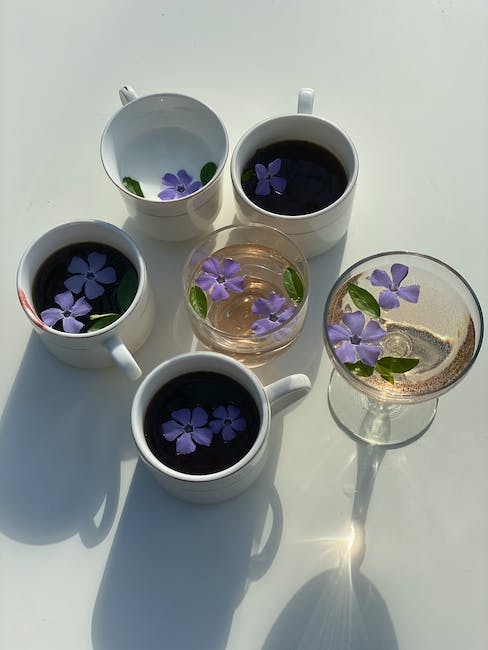Discover the Incredible Health Benefits of Hibiscus Tea
If you’re looking for a refreshing and healthy beverage option, you may want to consider adding hibiscus tea to your diet. This flavorful tea is known for its numerous health benefits, including its ability to boost your immune system, lower blood pressure, and reduce inflammation in the body. Here are some of the amazing health benefits of hibiscus tea that you may not know about:
Rich in Vitamin C
One of the most important benefits of hibiscus tea is its high vitamin C content. This essential nutrient is crucial for maintaining a healthy immune system, and it can help protect your body against various diseases and illnesses. By drinking hibiscus tea regularly, you can boost your vitamin C intake and give your immune system a much-needed boost.
Antioxidant Properties
Hibiscus tea is also rich in antioxidants, which can help prevent damage to cells and reduce the risk of chronic diseases such as cancer, diabetes, and heart disease. These powerful compounds work by neutralizing harmful free radicals in the body, which can cause oxidative stress and lead to cell damage.
Lower Blood Pressure
Studies have shown that hibiscus tea can help lower blood pressure, which is a major risk factor for heart disease and stroke. This is because the tea contains compounds that have a relaxing effect on the blood vessels, allowing them to dilate and improve blood flow. By drinking hibiscus tea regularly, you may be able to reduce your risk of heart disease and other cardiovascular problems.
Improve Heart Health
In addition to lowering blood pressure, hibiscus tea may also help improve overall heart health. Some studies have suggested that the tea can help lower cholesterol levels, reduce inflammation, and prevent the buildup of plaque in the arteries. These benefits can all contribute to a healthier heart and a reduced risk of heart disease.
Anti-Inflammatory Properties
Hibiscus tea also has anti-inflammatory properties, which can help reduce inflammation in the body and potentially reduce the risk of chronic diseases such as diabetes and arthritis. This is especially important given that inflammation is linked to a wide range of health problems and can contribute to the development of various diseases.
Positive Effect on Liver Health
Some studies have suggested that hibiscus tea may have a positive effect on liver health. This is because the tea contains compounds that can help protect the liver from damage and disease. By drinking hibiscus tea regularly, you may be able to reduce your risk of liver damage and improve your liver health in general.
Diuretic Effect
Finally, hibiscus tea has a mild diuretic effect, which can help reduce bloating and fluid retention. This makes it a great option for those who are looking to reduce their water weight and feel less bloated overall.
Caffeine-Free Option
If you’re looking for a caffeine-free beverage option, hibiscus tea is a great choice. Unlike many other teas and beverages, it does not contain caffeine, which can have negative effects on your health if consumed in excess. By drinking hibiscus tea instead, you can enjoy a delicious and healthy beverage without any of the negative side effects of caffeine.
In conclusion, hibiscus tea is an incredibly healthy and flavorful beverage option that can offer numerous health benefits. Whether you’re looking to boost your immune system, reduce your risk of heart disease, or simply enjoy a refreshing drink, hibiscus tea is definitely worth adding to your diet. So why not give it a try today and experience the amazing health benefits for yourself?
How to Brew the Perfect Cup of Hibiscus Tea
If you’re a tea lover looking for a new and exciting flavor, hibiscus tea might just be the perfect addition to your tea collection. This tart and refreshing tea is packed with antioxidants and is said to have numerous health benefits. Plus, it’s easy to brew at home with just a few simple steps.

Loose Leaf vs. Tea Bags
Hibiscus tea can be brewed using loose leaf hibiscus flowers or tea bags. While both options are readily available, loose leaf tea is usually considered to be of a higher quality and provides a more flavorful and aromatic cup of tea.
Brewing the Perfect Cup
To brew loose leaf hibiscus tea, start by boiling water in a kettle or pot. The recommended temperature for brewing hibiscus tea is around 200F (93C). Here are the steps to follow:
- Measure out the desired amount of loose leaf hibiscus tea. Typically, 1 teaspoon of loose leaf tea is enough for 8 ounces of water. Adjust the amount of tea based on personal preference.
- Place the tea leaves in a tea infuser or a tea strainer. If using a teapot, place the tea leaves directly in the pot.
- Pour the hot water over the tea leaves and let it steep for 5-7 minutes. This steeping time may vary based on personal preference, but it is important not to oversteep the tea as it can result in a bitter taste.
- After the steeping time is up, remove the tea infuser or strain the tea leaves and pour the tea into a cup.
Serving and Flavor Enhancements
Hibiscus tea can be enjoyed hot or cold, and is often sweetened with honey or sugar to balance out the tartness of the tea. Adding lemon or lime juice can also enhance the flavor of the tea.
In conclusion, brewing the perfect cup of hibiscus tea is simple and easy. Experiment with different amounts of loose leaf tea and steeping times to find your perfect cup. And don’t forget to add some sweeteners or flavor enhancements to make it even more enjoyable. Happy brewing!
Discover the Versatility of Hibiscus Tea: From Iced Teas to Cocktails and Desserts
Are you looking for a versatile ingredient to add to your recipes? Look no further than hibiscus tea! This flavorful and vibrant tea can be used in a variety of ways, from refreshing iced teas to flavorful cocktails and desserts. Here are some creative ideas to get you started:
1. Hibiscus Iced Tea
One of the most popular ways to enjoy hibiscus tea is as an iced tea. It’s simple to make – just brew a strong batch of tea using loose leaf hibiscus tea, let it cool, and then serve over ice with a slice of lemon or lime. But why stop there? Experiment with adding other ingredients to your hibiscus tea, such as fresh mint, ginger, or honey, for a more flavorful and unique iced tea experience.
| Ingredients | Instructions |
|---|---|
| 1 cup loose leaf hibiscus tea | Boil water and steep the hibiscus tea for 5-7 minutes. Let it cool. |
| 5-6 mint leaves | Add to the cooled hibiscus tea and let it sit for 5-10 minutes. |
| 1 tbsp honey | Stir in the honey to taste and serve over ice. |
2. Hibiscus Cocktails
Hibiscus tea can also be used as a base for exciting and flavorful cocktails. Try these popular hibiscus cocktail recipes:
- Hibiscus Margarita: Combine hibiscus tea with tequila, lime juice, and agave nectar.
- Hibiscus Mojito: Add fresh mint and rum to your hibiscus tea mix.
- Hibiscus Sangria: Include red wine, brandy, and a variety of fruits for a fruity and refreshing cocktail.
3. Hibiscus in Cooking and Baking
Don’t limit the use of hibiscus tea to just beverages. Get creative in the kitchen and try these unique ideas:
- Hibiscus-infused syrups or jams
- Use hibiscus tea as a marinade for meats or tofu
- Add hibiscus tea to cake or muffin batters for a unique flavor twist
The possibilities are endless with hibiscus tea. Experiment with different recipes and share your creations with friends and family. You’ll be sure to impress them with your newfound culinary skills.
So, what are you waiting for? Try out hibiscus tea in your recipes today and enjoy its vibrant and unique flavor!
Exploring the Different Types of Hibiscus Tea
Hibiscus tea is a popular herbal beverage that has been enjoyed for centuries in different cultures around the world. It is made from the dried calyces of the hibiscus plant, which give it a tangy and fruity flavor, as well as a vibrant red color. However, not all hibiscus teas are the same. In this article, we will explore the different types of hibiscus tea and their unique characteristics.
The Classic Roselle Hibiscus Tea
The most common type of hibiscus tea is made from the Hibiscus sabdariffa plant, also known as Roselle. This variety is widely grown in tropical regions, such as West Africa, the Caribbean, and Southeast Asia. The Roselle hibiscus has a tart and slightly sour taste that is reminiscent of cranberries. It is often used for making hot or iced tea, as well as for flavoring cocktails, sauces, and desserts.
One of the benefits of Roselle hibiscus tea is its high content of antioxidants, such as flavonoids and anthocyanins, which have been linked to various health benefits, such as reducing inflammation, improving digestion, and protecting the heart and liver. In addition, Roselle hibiscus tea is caffeine-free and low in calories, making it a healthy and refreshing alternative to sugary drinks.
Other Varieties of Hibiscus Tea
Aside from Roselle hibiscus, there are other varieties of hibiscus tea that can offer different flavors and aromas. For example, the Hibiscus rosa-sinensis, also known as Chinese hibiscus, has a milder taste and a wider range of colors, from white to pink to red. It is often used for ornamental purposes, but its flowers can also be brewed into tea or blended with other herbs and fruits.
The Hibiscus acetosella, also known as African rosemallow or false roselle, is another type of hibiscus that is native to tropical Africa. It has a tangy and slightly citrusy taste, and its leaves are often used for making soups and stews. Its flowers can also be brewed into tea, either alone or with other ingredients.
Blended Hibiscus Teas
One of the advantages of hibiscus tea is its versatility in blending with other herbs, fruits, and spices. Blended hibiscus teas can offer a wider range of flavors and health benefits, as well as create a more complex and enjoyable drinking experience. Some popular blends include:
- Hibiscus-mint tea: a refreshing and soothing blend that can help with digestion and relaxation.
- Hibiscus-ginger tea: a spicy and warming blend that can aid in digestion and soothe sore throat.
- Hibiscus-lemon tea: a citrusy and tangy blend that can boost immunity and detoxify the body.
- Hibiscus-berry tea: a fruity and sweet blend that can provide antioxidants and vitamins.
When choosing a blended hibiscus tea, it is important to read the ingredients list and choose high-quality and organic ingredients. Some blends may contain artificial flavors, colors, or sweeteners, which can detract from the health benefits of hibiscus tea.
Hibiscus Tea Blends for Health
Hibiscus tea is not only a delicious and refreshing beverage, but it can also offer various health benefits when combined with other herbs and plants. Some popular hibiscus tea blends for health include:
- Hibiscus-detox tea: a cleansing and purifying blend that can support the liver and kidneys.
- Hibiscus-immune tea: a strengthening and protective blend that can boost the immune system and prevent infections.
- Hibiscus-menstrual tea: a soothing and balancing blend that can relieve menstrual cramps and regulate hormones.
- Hibiscus-blood pressure tea: a regulating and calming blend that can lower high blood pressure and improve circulation.
These blends may contain other herbs and plants, such as dandelion, net


Leave a Reply